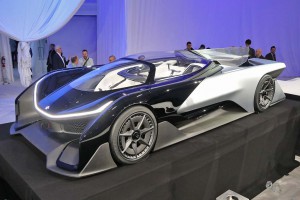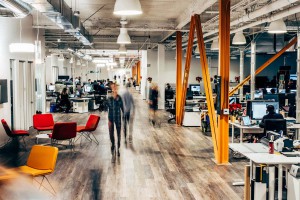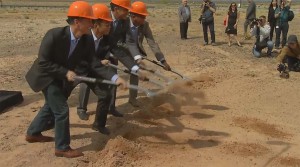Faraday Future, the mysterious, Chinese-owned automotive start-up, has taken a critical step closer to getting something on the road.
Based in the old Nissan headquarters in suburban Los Angeles, Faraday has signed up the Korean-owned LG Chem to provide the lithium-ion batteries that will power its planned line-up of electric vehicles. LG Chem is the same battery supplier used for the Chevrolet Volt plug-in hybrid and Chevy Bolt battery-electric vehicle.
“LG Chem worked closely with Faraday Future to develop a tailored cell chemistry to optimize the range and safety of our mass production battery hardware,” said Tom Wessner, Faraday Future’s vice president of global supply chain.
(Apple loses key exec on its automotive program. Click Here for the story.)
The batteries will be housed inside what Faraday is calling a “variable platform architecture.” It’s a skateboard-like design that places the pack underneath the load floor to lower a vehicle’s center of gravity and maximize the space available to passengers and cargo. It’s a similar approach to what Chevy is using on the Bolt and how Tesla has designed products like the Models S and X and the upcoming Model 3 battery sedan.
The Faraday architecture is also extremely flexible, according to the company, allowing it to use the platform for different kinds of vehicles – such as sedans, crossovers and sports cars – of differing lengths and widths. They can be powered by one or more motors driving the front or rear wheels, or creating a “through-the-road” all-wheel-drive system.
Faraday has hinted it may have several different products in the pipeline, but it has so far shown only one concept vehicle, a striking sports car, dubbed the FF Zero1, that made its debut during a splashy event at the Consumer Electronics Show in Las Vegas last January.
At the time, lead designer Richard Kim called the FF Zero1 “a concept of cars,” admittedly nothing more than an “electric dream car,” Kim stressed, rather than something likely to go into production.
The first Faraday Future entry is expected to be slightly more conventional, at least in the sense of having room for more passengers. A video the company has shown focuses on something that appears to more in the crossover category, a sort of futuristic bubble-car.
While Faraday continues to maintain a tight lid on product details, it has taken the covers off other key developments. In May, it staged a groundbreaking at a site outside Los Vegas where it expects to invest about $1 billion. The facility is promised to use advanced manufacturing techniques to improve output while reducing costs. There have been reports it also is negotiating to build a second manufacturing facility near Vallejo, California.
(For more on Faraday Future, Click Here.)
The newest announcement pairs FF up with one of the world’s biggest automotive battery manufacturers. LG Chem already supplies about 20 different automakers, including General Motors.
“As a leading supplier of automotive cells and batteries, we are proud to work alongside Faraday Future as we work together to create the next generation of electric vehicles,” said UB Lee, the President of Energy Solution Company, LG Chem. “Our progress so far represents a major step forward in battery technology, and we look forward to growing our partnership and co-developing hardware into the future.”
Despite the plant and battery announcements, much remains unanswered about Faraday Future. There has been plenty of speculation about what is really going on. It is widely expected that the products it is developing will use advanced electronic systems, possibly including autonomous driving capabilities. During the CES presentation, in fact, designer Kim referred to the FF Zero1 as “an extreme tablet on wheels.”
Such expectations seem all the more grounded considering the fact that Faraday’s lead investor, Chinese billionaire Jia, owns LETV, a company frequently compared to both Apple and Netflix. Faraday vehicles will plug into the network of services LETV provides, FF officials have said.
Some have also speculated that Faraday is building a relationship with Apple to use some of its technologies. Apple is widely believed to be working on its own car program, though the tech giant has yet to confirm what it has under wraps.
Considering the timing of the Nevada plant, production likely wouldn’t get underway on whatever Faraday is developing until sometime in 2018 or soon afterwards.
(Old Fisker Karma returns plug-in returns as Karma Revero. Click Here for more.)



